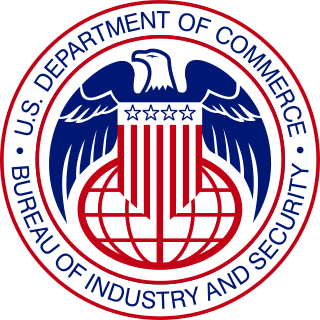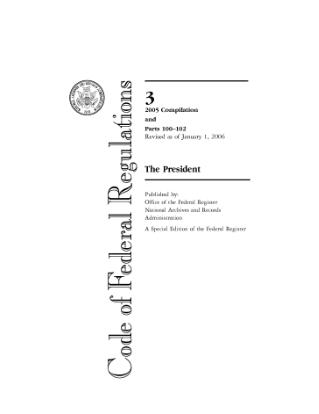Title 15 is the portion of the Code of Federal Regulations that governs Commerce and Foreign Trade within the United States. It is available in digital or printed form.
Title 15 comprises three volumes, and is divided into four Subtitles:
Subtitle A (§§ 0-29) covers regulations associated with the office of the U.S. Secretary of Commerce, and is primarily concerned with conduct of, restrictions on, and disciplinary proceedings concerning employees of that office. Subtitle A occupies a portion of volume 1.
Subtitle B covers Regulations Relating to Commerce and Foreign Trade. It begins in volume 1 and continues through volume 3. Subtitle B consists of the following chapters:
| Volume | Chapter | Sections | Scope |
|---|---|---|---|
| 1 | I | 30-199 | Bureau of the Census (Department of Commerce) |
| II | 200-299 | National Institute of Standards and Technology (Department of Commerce) | |
| 2 | III | 300-399 | International Trade Administration (Department of Commerce) |
| IV | 400-499 | Foreign-Trade Zones Board (Department of Commerce) | |
| VII | 700-799 | Bureau of Industry and Security (Department of Commerce) | |
| 3 | VIII | 800-899 | Bureau of Economic Analysis (Department of Commerce) |
| IX | 900-999 | National Oceanic and Atmospheric Administration (Department of Commerce) | |
| XI | 1100-1199 | Technology Administration (Department of Commerce) | |
| XIII | 1300-1399 | East-West Foreign Trade Board | |
| XIV | 1400-1499 | Minority Business Development Agency |
Subtitle C (§§ 2000–2099) comprises regulations relating to foreign trade agreements administered by the Office of the United States Trade Representative. Subtitle C occupies a portion of volume 3.
Subtitle D (§§ 2300–2399) comprises regulations relating to the National Telecommunications and Information Administration (Department of Commerce) and concludes volume 3.

The Communications Act of 1934 is a United States federal law signed by President Franklin D. Roosevelt on June 19, 1934, and codified as Chapter 5 of Title 47 of the United States Code, 47 U.S.C. § 151 et seq. The act replaced the Federal Radio Commission with the Federal Communications Commission (FCC). It also transferred regulation of interstate telephone services from the Interstate Commerce Commission to the FCC.

The United States Department of Commerce (DOC) is an executive department of the U.S. federal government concerned with creating the conditions for economic growth and opportunity.

The Bureau of Industry and Security (BIS) is an agency of the United States Department of Commerce that deals with issues involving national security and high technology. A principal goal for the bureau is helping stop the proliferation of weapons of mass destruction, while furthering the growth of United States exports. The Bureau is led by the Under Secretary of Commerce for Industry and Security.

The International Trade Administration (ITA) is an agency in the United States Department of Commerce that promotes United States exports of nonagricultural U.S. goods and services.

In the law of the United States, the Code of Federal Regulations (CFR) is the codification of the general and permanent regulations promulgated by the executive departments and agencies of the federal government of the United States. The CFR is divided into 50 titles that represent broad areas subject to federal regulation.
The Internal Revenue Code of 1986 (IRC), is the domestic portion of federal statutory tax law in the United States. It is codified in statute as Title 26 of the United States Code. The IRC is organized topically into subtitles and sections, covering federal income tax in the United States, payroll taxes, estate taxes, gift taxes, and excise taxes; as well as procedure and administration. The Code's implementing federal agency is the Internal Revenue Service.
The Export Administration Regulations (EAR) are a set of United States export guidelines and prohibitions. They are administered by the Bureau of Industry and Security which regulates the export restrictions of sensitive goods. The EAR apply to scenarios where something is exported from the US, re-exported from a foreign country, or transferred from one person to another in a foreign country. The EAR apply to physical objects as well as intellectual property such as software.
The USA PATRIOT Act was passed by the United States Congress in 2001 as a response to the September 11, 2001 attacks. It has ten titles, each containing numerous sections. Title III: International Money Laundering Abatement and Financial Anti-Terrorism Act of 2001 is actually an act of Congress in its own right as well as being a title of the USA PATRIOT Act, and is intended to facilitate the prevention, detection and prosecution of international money laundering and the financing of terrorism. The title's sections primarily amend portions of the Money Laundering Control Act of 1986 and the Bank Secrecy Act of 1970.
The USA PATRIOT Act was passed by the United States Congress in 2001 as a response to the September 11 attacks in 2001. It has ten titles, with the third title written to prevent, detect, and prosecute international money laundering and the financing of terrorism.
Title 49 of the United States Code is a positive law title of the United States Code with the heading "Transportation."
Title 40 of the United States Code outlines the role of Public Buildings, Properties, and Public Works in the United States Code.
Title 46 of the United States Code, titled "Shipping", outlines the federal laws contained within the United States Code that pertain to the shipping industry. It was gradually codified into the Positive Law of the United States, with partial codifications being enacted in the years 1988, 2002, and 2003. The title was fully codified into the Positive Law on October 6, 2006, when then-President George W. Bush signed Public Law 109-304 into law.
Title 47 of the United States Code defines the role and structure of the Federal Communications Commission, an independent agency of the United States government, and the National Telecommunications and Information Administration, part of the United States Department of Commerce. It also criminalizes damage by ships to underwater cables and defines how candidates for political office receive special access to broadcast stations. The Communications Act of 1934, the Communications Assistance for Law Enforcement Act, and the Launching Our Communities' Access to Local (LOCAL) Television Act of 2000 are codified in this title.
Information technology law, also known as information, communication and technology law or cyberlaw, concerns the juridical regulation of information technology, its possibilities and the consequences of its use, including computing, software coding, artificial intelligence, the internet and virtual worlds. The ICT field of law comprises elements of various branches of law, originating under various acts or statutes of parliaments, the common and continental law and international law. Some important areas it covers are information and data, communication, and information technology, both software and hardware and technical communications technology, including coding and protocols.
Title 41 of the Code of Federal Regulations ("CFR"), titled Public Contracts and Property Management, is the portion of the CFR that governs federal government public contracts within the United States. It is available in digital or printed form.
The Office of Export Enforcement (OEE) is a part of the United States Department of Commerce, Bureau of Industry and Security.

The Hazardous Materials Transportation Act (HMTA), enacted in 1975, is the principal federal law in the United States regulating the transportation of hazardous materials. Its purpose is to "protect against the risks to life, property, and the environment that are inherent in the transportation of hazardous material in intrastate, interstate, and foreign commerce" under the authority of the United States Secretary of Transportation.
Title 2 of the Code of Federal Regulations (2 CFR), titled Grants and Agreements, is a United States federal-government regulation.
The Dodd–Frank Wall Street Reform and Consumer Protection Act was created as a response to the financial crisis in 2007. Passed in 2010, the act contains a great number of provisions, taking over 848 pages. It targets the sectors of the financial system that were believed to be responsible for the financial crisis, including banks, mortgage lenders, and credit rating agencies. Ostensibly aimed at reducing the instability that led to the crash, the act has the power to force these institutions to reduce their risk and increase their reserve capital.
United States foreign adversaries, as defined in the Title 15 of the Code of Federal Regulations, Subtitle A, Part 7, Subpart A § 7.2, is "any foreign government or foreign non-government person determined by the Secretary to have engaged in a long-term pattern or serious instances of conduct significantly adverse to the national security of the United States or security and safety of United States persons".